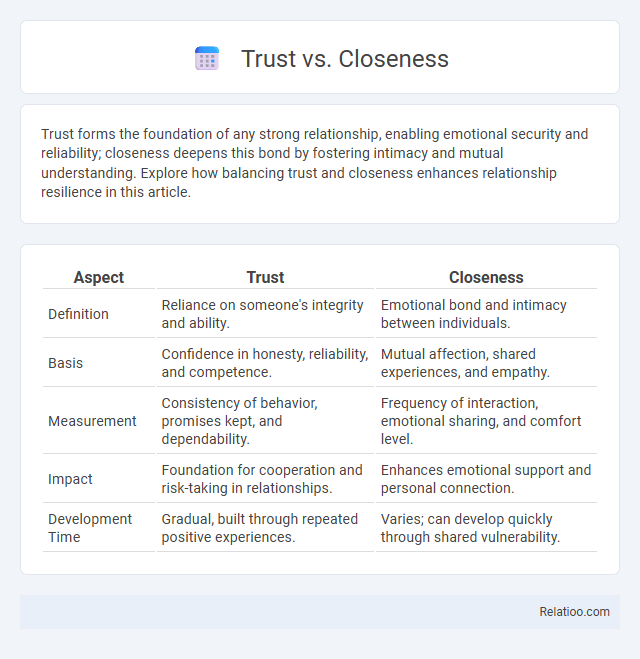Trust forms the foundation of any strong relationship, enabling emotional security and reliability; closeness deepens this bond by fostering intimacy and mutual understanding. Explore how balancing trust and closeness enhances relationship resilience in this article.
Table of Comparison
| Aspect | Trust | Closeness |
|---|---|---|
| Definition | Reliance on someone's integrity and ability. | Emotional bond and intimacy between individuals. |
| Basis | Confidence in honesty, reliability, and competence. | Mutual affection, shared experiences, and empathy. |
| Measurement | Consistency of behavior, promises kept, and dependability. | Frequency of interaction, emotional sharing, and comfort level. |
| Impact | Foundation for cooperation and risk-taking in relationships. | Enhances emotional support and personal connection. |
| Development Time | Gradual, built through repeated positive experiences. | Varies; can develop quickly through shared vulnerability. |
Defining Trust and Closeness
Trust is a fundamental psychological state characterized by the willingness to be vulnerable based on positive expectations of another's intentions or behavior, rooted in reliability, integrity, and competence. Closeness refers to the perceived emotional intimacy and connectedness between individuals, embodying feelings of warmth, affection, and mutual understanding. Defining trust involves assessing consistency and dependability, while defining closeness centers on the depth of emotional bonds and interpersonal communication.
Key Differences Between Trust and Closeness
Trust involves a belief in someone's reliability and integrity, while closeness refers to the emotional intimacy and personal connection shared between individuals. Trust is often built over time through consistent actions and can exist without deep emotional closeness, whereas closeness requires mutual vulnerability and shared experiences. The key difference lies in trust being a foundational expectation for dependable behavior, whereas closeness reflects the depth of relational bonding and emotional involvement.
The Role of Trust in Building Relationships
Trust serves as the foundational element in building and sustaining close relationships by fostering emotional security and openness. High levels of trust enable individuals to share vulnerabilities and support each other, strengthening interpersonal bonds and promoting long-term closeness. Without trust, relationships often struggle to develop depth, as uncertainty and fear hinder genuine connection and mutual understanding.
How Closeness Influences Emotional Bonds
Closeness significantly strengthens emotional bonds by fostering open communication and mutual understanding, which enhances trust between individuals. Your ability to share personal experiences and vulnerabilities in close relationships creates a secure foundation for emotional intimacy. These deeper connections promote empathy and support, crucial for maintaining lasting trust and emotional resilience.
Can You Have Trust Without Closeness?
Trust can exist without closeness, as it often develops through consistent reliability and dependability rather than emotional intimacy. Your ability to trust someone may be based on observed actions and proven competence, even in the absence of deep personal connection or frequent interaction. Establishing trust without closeness is common in professional settings or new relationships where confidence is built gradually over time.
The Interplay Between Trust and Closeness
The interplay between trust and closeness shapes the quality of interpersonal relationships by influencing emotional security and openness. Trust fosters vulnerability, enabling deeper closeness, while increased closeness reinforces trust through shared experiences and mutual understanding. Your ability to balance these elements determines the strength and resilience of your connections.
Building Closeness Without Sacrificing Trust
Building closeness without sacrificing trust requires transparent communication and consistent reliability, ensuring that both emotional intimacy and dependability are maintained. You can foster deeper connections by sharing vulnerabilities while setting clear boundaries to protect mutual respect and confidence. Prioritizing honest dialogue and genuine empathy strengthens relationships without compromising the essential foundation of trust.
Trust and Closeness in Romantic Relationships
Trust forms the foundation of secure romantic relationships, enabling emotional vulnerability and mutual support. Closeness fosters intimacy and connectedness by encouraging open communication and shared experiences. Your ability to build trust strengthens closeness, enhancing relationship satisfaction and long-term stability.
Overcoming Barriers to Trust and Closeness
Overcoming barriers to trust and closeness requires consistent communication, vulnerability, and empathy to foster genuine connections. Building trust involves addressing past betrayals or misunderstandings through active listening and transparent actions. Closeness grows as emotional safety is established, allowing individuals to share freely without fear of judgment or rejection.
Nurturing Both Trust and Closeness for Healthy Connections
Nurturing both trust and closeness is essential for building healthy connections, as trust fosters safety and reliability while closeness promotes emotional intimacy and understanding. Developing consistent communication, vulnerability, and empathy strengthens the balance between these elements, leading to deeper relational bonds. Maintaining this equilibrium supports long-term relationship satisfaction and resilience against conflicts.

Infographic: Trust vs Closeness
 relatioo.com
relatioo.com